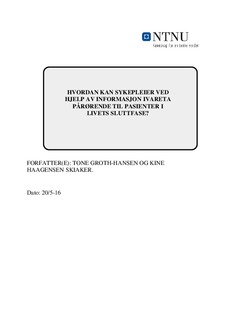| dc.contributor.advisor | Kletthagen, Hege | |
| dc.contributor.author | Groth-Hansen, Tone Nordmoen | |
| dc.contributor.author | Skiaker, Kine Haagensen | |
| dc.date.accessioned | 2016-09-01T10:46:13Z | |
| dc.date.available | 2016-09-01T10:46:13Z | |
| dc.date.issued | 2016-09-01 | |
| dc.identifier.uri | http://hdl.handle.net/11250/2403394 | |
| dc.description.abstract | Introduksjon: Å være pårørende til døende pasienter kan by på store følelsmessige belastinger og det er mange spørsmål som kan dukke opp. Derfor er det nødvendig med god informasjon fra sykepleier om alle aspekter ved å være døende slik at pårørende føler seg tryggere i situasjonene og godt ivaretatt. Hensikt: Sette fokus på hvordan god informasjon kan hjelpe pårørende til pasienter i livets sluttfase, og på hvilken måte denne best kan formidles slik at de pårørende føler seg ivaretatt. Metode: Oppgaven er laget som litteraturstudie i forhold til metode. Det er foretatt systematiske og usystematiske søk i Ovid, Cinhal, SweMed+ og PubMed, mest brukte søkeord: Next of kin, end of life care, hydration, nursing home. Hovedresultater: Hovedresultater viser at det er store utfordringer i forhold til rutiner for informasjon gitt fra sykepleier og kunnskap om livsforlengende behandling blant de pårørende. Det er mangelfulle rutiner på samtaler rundt beslutningsprosessen som omhandler livsforlengende behandling til pasientene og ivaretakelse av deres autonomi. Konklusjon: Litteraturstudien bekrefter at de pårørende føler seg godt ivaretatt i tilfeller der sykepleier gir gjentatt og oppdatert informasjon. Dette øker også forståelsen til pårørende om hvorfor livsforlengende behandling i terminalfasen anses å være nytteløst. Informasjon og ivaretakelse av pårørende til denne pasientgruppen har stort forbedringspotensial. | nb_NO |
| dc.description.abstract | Introduction: Relatives to dying patients may suffer emotional stress and there are many questions that may arise. It is therefore necessary that healthcare proffesionals inform relatives about the aspects to end-of-life care so that the relatives feel taken care of. Aim: Focus on how information can help relatives of patients in end-of-life care, and how healthcare profesionals can convey this information. Method: The thesis is based on a literature review as a method. Unsystematic and systematic searches are conducted in the following databases in Ovid, Cinhal, SweMed + and PubMed. Keywords: Next of kin, end of life care, hydration, nursing home. Main results: Results shows that there are major challenges in relation to procedures for information given by healthcare profesionals and knowledge of life-prolonging treatment among the relatives. There are no routines for conversations considering the decision-making process,concerning life-prolonging treatment to patients and protect their autonomy. Conclusion: The literature study confirms that the relatives feel taken care of when healthcare profesionals give updated information. This also increases the knowledge of relatives about why life-prolonging treatment in end-of-life care is considered to be futile. Information and care of relatives has potential for improvement. | nb_NO |
| dc.language.iso | nob | nb_NO |
| dc.subject | Pårørende | nb_NO |
| dc.subject | Informasjon | nb_NO |
| dc.subject | Væskebehandling | nb_NO |
| dc.subject | Sykepleier | nb_NO |
| dc.subject | Palliasjon | nb_NO |
| dc.subject | Relatives | nb_NO |
| dc.subject | Information | nb_NO |
| dc.subject | Hydration Therapy | nb_NO |
| dc.subject | Nursing | nb_NO |
| dc.subject | Palliative Care | nb_NO |
| dc.title | Hvordan kan sykepleier ved hjelp av informasjon ivareta pårørende til pasienter i livets sluttfase? | nb_NO |
| dc.title.alternative | How can nurse with help of information attend to relatives of patients in end of life care? | nb_NO |
| dc.type | Bachelor thesis | nb_NO |
| dc.subject.nsi | VDP::Medical disciplines: 700::Health sciences: 800::Nursing science: 808 | nb_NO |
| dc.source.pagenumber | 52 | nb_NO |
